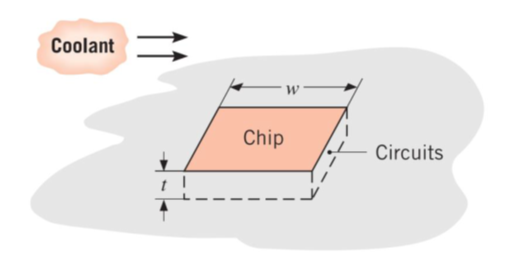How does CPU Cooling Work?
A square silicon chip (k = 150 W/m∙K) is of width w = 5 mm on a side and of thickness t = 1 mm. The chip is mounted in a substrate such that its side and back surfaces are insulated, while the front surface is exposed to a coolant. If 40 W are being dissipated in circuits mounted to the back surface of the chip, what is the steady-state temperature difference between back and front surfaces?

Expand Hint
Fourier's law of conduction:
$$$\dot{Q}=kA\frac{\Delta T}{dx}$$$
where
$$\dot{Q}$$
is the rate of heat transfer,
$$k$$
is the thermal conductivity,
$$A$$
is the surface area perpendicular to the direction of heat transfer,
$$\Delta T$$
is the change in temperature, and
$$dx$$
is the distance.
Hint 2
$$$\Delta T=\frac{t\times \dot{Q}}{k\cdot w^2}$$$
ASSUMPTIONS
: (1) Steady state conditions, (2) Constant properties, (3) Uniform heat dissipation, (4) Negligible heat loss from back and sides, (5) One-dimensional conduction chip.
All the electrical power dissipated at the chip’s back surface is transferred by conduction. From Fourier’s law:
$$$\dot{Q}=kA\frac{\Delta T}{dx}$$$
where
$$\dot{Q}$$
is the rate of heat transfer,
$$k$$
is the thermal conductivity,
$$A$$
is the surface area perpendicular to the direction of heat transfer,
$$\Delta T$$
is the change in temperature, and
$$dx$$
is the distance. Thus,
$$$\Delta T=\frac{t\times \dot{Q}}{k\cdot w^2}=\frac{0.001m\times 40W}{150W/m\cdot K(0.005m)^2}=11\:K$$$
11 K
Time Analysis
See how quickly you looked at the hint, solution, and answer. This is important for making sure you will finish the FE Exam in time.- Hint: Not clicked
- Solution: Not clicked
- Answer: Not clicked
Similar Problems from FE Sub Section: Conduction
001. Find the Heat Transfer and Flux
046. Electrical Heater Rod
062. Cooling a CPU
301. Brick Wall
562. Heat Transfer Area
607. Heating Distance
Similar Problems from FE Section: Basic Heat-Transfer Rate Equations
001. Find the Heat Transfer and Flux
045. A Steam Pipe
046. Electrical Heater Rod
062. Cooling a CPU
093. Convection and Velocity
203. Heat Transfer Rate
212. Heat Transferring
255. Heat Transfer
301. Brick Wall
493. Heat Transfer Coefficient
497. Change in Temp
561. Radiation
562. Heat Transfer Area
607. Heating Distance
659. Radiation Temp